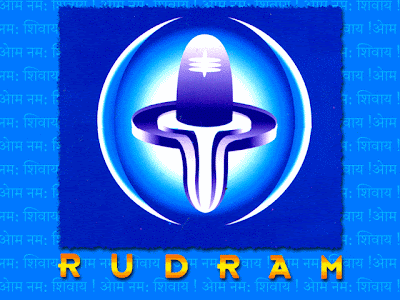
RUDRAM
Eighth Anuvaka
Namah Somaya cha Rudraya cha
Salutations to Him who is with His consort Uma and Him who destroys illusions.
Here Soma is translated as Siva/Shakti, or with Uma as His other half, or Ardhanarishvara. Usually there is more than one meaning to these words, and therefore Soma is also translated as 'the moon glow of the mystics vision', which would be obvious to the meditator.
When in meditation, looking afar, up above the sahasra chakra, we see a pale blue sky with the moon at high noon. This is Soma. Its/His spreading rays (Cipivista aka Vishnu) bathes us in His Glory. This explains the crescent moon on the head of the One Lord in His icon, as Somanatha.
Indra was a great drinker of Soma; before his confrontation with Vritra he drank rivers of it to gain the strength needed to overcome the fearsome dragon who obstructed the fertile flow of the waters. Agni also consumed it in large amounts. Soma was what gave the Vedic gods their strength and immortality.
The Rig veda (8.48) states, "We have drunk the Soma; we have become immortal; we have gone to the light; we have found the gods."
This sutra is often taken to show that soma is a juice or ambrosia; but it really means that Soma is a Lord who has penetrated the stilled mind of the worshipper, who has been filled with the joy of Soma, a condition of enlightenment, the state of immanent satchidananda.
When Soma flows (the glow of the moon in meditation) it makes the mind pure. The moon-glow, Cipivista, drenches the mind, makes it clear, and provides all kinds of medicines for ailments. The clear and stilled mind is the mind of Rudra. This clears the confusion as to who, or what is Soma.
From the RUDRAM:
Namaste astu Bhagavan Visvesvaraaya Mahadevaaya,
Triyambakaaya Tripurantakaaya Trikaagnikaalaaya Kaalaagnirudraaya Nilakantaaya Mrtyunjayaaya,
Sarvesvaraaya Sadasivaaya SrimanMahadevaaya namaha.
Trikaagnikaalaaya is translated as 'one who alone holds awareness of God, Soul and the World'.
The many Hindu philosophies are attempts to understand the nature of these 3 entities, although we are told by Kutsa, that only He, Rudra, knows, and the relationship between these 3 entities cannot ever be known (explained) by others.
Concluding verse in the RUDRAM:
Praanaanaam Grantirasi Rudro
O Rudra, you are even the veil that comes between us!
Maa Visaantakah Tenaan nenaa apyaa yasva.
Let that which separates us be consumed by you!

